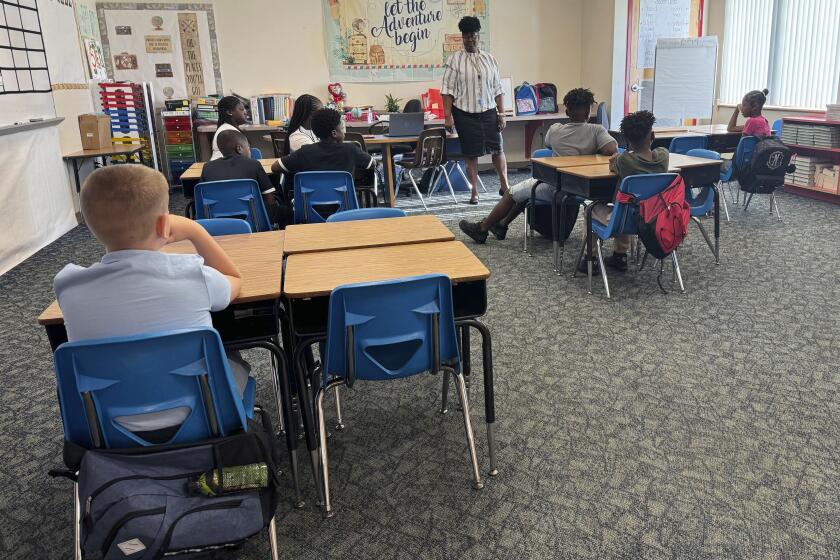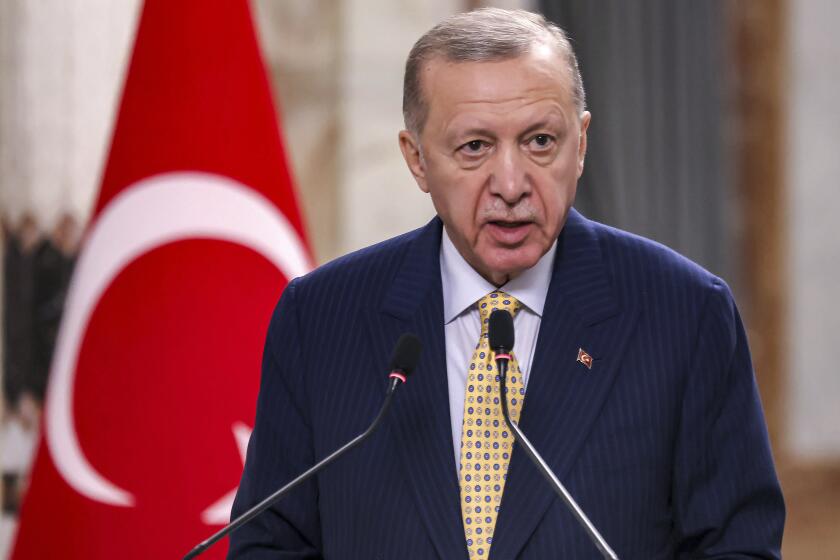9/11 Attack Investigators Complain About Hindrances
Leaders of a federal commission investigating the Sept. 11 attacks complained Tuesday that the Bush administration has been too slow to provide access to key documents and is intimidating witnesses by insisting that CIA and FBI “minders” attend sensitive interviews.
The chairman of the commission, former New Jersey Gov. Thomas H. Kean, said the delays are threatening the panel’s ability to meet its congressionally imposed deadline and produce a final report before the 2004 presidential election.
“The coming weeks will determine whether we will be able to do our job within the time allotted,” Kean, a Republican, said during a news conference billed as an interim progress report. “Time is slipping by.”
Kean and commission Vice Chairman Lee H. Hamilton were particularly critical of the administration’s insistence that interviews with intelligence or law enforcement officials be supervised.
“The commission feels unanimously it is some intimidation to have someone sitting behind you all the time,” Kean said.
The CIA acknowledged that it requires all interviews with its employees to be monitored, but denied the practice has any chilling effect.
“It has been the CIA’s standing operating procedure for decades,” said CIA spokesman Mark Mansfield. He said the minder is only present to keep a record of any classified information that is disclosed.
Asked whether the presence of a monitor might discourage witnesses from being forthcoming, Mansfield said: “We have not heard that from our employees. They understand the purpose and do not see it that way.”
Despite their criticism of the administration, Kean and Hamilton -- a former Democratic congressman from Indiana -- said they do not believe the White House is stonewalling investigators.
And the officials said that in some cases they are getting access to highly sensitive materials that congressional investigators did not obtain in a separate Sept. 11 probe that concluded earlier this year.
Kean said the commission has gotten transcripts of interrogations of Al Qaeda detainees. He declined to identify the prisoners, but a commission official said the panel has received interrogation records of at least half a dozen top Al Qaeda operatives now in custody -- a group that would include accused Sept. 11 mastermind Khalid Sheikh Mohammed and operations organizer Abu Zubaydah.
The commission also is expecting to receive, as early as this week, National Security Council documents that were not provided to congressional investigators, Kean said. He declined to elaborate, but acknowledged that the commission has requested NSC minutes and presidential briefings from the months leading up to the attacks.
Kean said that in some cases, agencies have been slow to turn over records in part because they have been caught off guard by the nature and volume of materials the commission has requested. Some of these records include officials’ private diaries and notes, Kean said.
The commission was created seven months ago and is widely perceived to have gotten off to a slow start. Tuesday’s news conference appeared designed to quiet such criticism and put fresh pressure on the White House to accelerate the turnover of records.
The complaints from commission leaders prompted prominent lawmakers on Capitol Hill, as well as relatives of victims of the Sept. 11 attacks, to question whether the White House is trying to stall until the commission runs out of time or the presidential election is over.
“This administration has opposed at every turn the creation of an independent commission to investigate the tragedy of Sept. 11th,” said Sen. Joe Lieberman (D-Conn.), a presidential candidate who co-sponsored legislation creating the panel. “By delaying its response to the commission’s information requests, the administration may now be hoping to run out the clock.”
The White House has dismissed such criticisms, saying it is cooperating fully with the investigation. Just this week, the administration designated a senior Justice Department official to expedite handling of requests for information.
The commission’s report is due May 27. Kean said members do not plan to seek an extension.
President Bush initially opposed the creation of the panel, saying it would distract intelligence agencies in the midst of the war on terrorism. But he reversed his position after congressional investigators unearthed evidence that the FBI and CIA had mishandled clues and warnings of the Sept. 11 plot.
Commission officials said they have encountered obstacles at numerous agencies.
The Justice Department, they said, has sought to block access to a number of important files on the grounds that turning over the records might contaminate the prosecution of Zacarias Moussaoui, the only suspect charged in direct connection with the Sept. 11 attacks on New York City and the Pentagon.
And Hamilton was particularly critical of the Pentagon, saying the panel has not received responses to requests for information from the North American Aerospace Defense Command, which is responsible for patrolling skies over the United States.
Hamilton said the CIA has been helpful in arranging briefings, but has been “slower in producing the internal documents that we have requested on management and resource choices in the pre-Sept. 11 war on terrorism.”
That topic became a critical issue in last year’s congressional hearings, with key lawmakers contending that the agency had done little to mobilize against Al Qaeda despite a memo from CIA Director George J. Tenet declaring “war” on the terrorist organization.
The commission itself has been beset with problems. The administration’s first choice as chairman, former Secretary of State Henry A. Kissinger, was forced to bow out when he refused to disclose certain financial and business records.
And members of the panel complained for months after its inception that it wasn’t moving quickly enough to get them security clearances and access to classified records of the congressional inquiry.
But Kean said those problems have been solved, and that with a staff of 60 and a $14-million budget, the commission can meet its deadline and produce a substantial report if it gets adequate cooperation from the administration. He said the commission plans another report in September.
More to Read
Sign up for Essential California
The most important California stories and recommendations in your inbox every morning.
You may occasionally receive promotional content from the Los Angeles Times.










